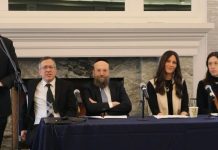Machberes: Inside The Chassidish And Yeshivish World
By Rabbi Gershon Tannenbaum
A most painful issue has arisen within the halachic community. Tamar E. recently remarried without a get (Jewish divorce) from her husband, Aaron F. Supposedly, permission for her to remarry without the necessary Jewish divorce was granted by a leading rosh yeshiva and one or two respected halachic experts. One of the two is acknowledged as a foremost master of Jewish divorce. Denounced by halachic authorities when the permission was granted and publicized, some 18 months ago, the furor has erupted now that Tamar E. has remarried.
A protest was organized to take place at the Agudah Convention, November 12—15, in Stamford, CT, where the rosh yeshiva was a keynote speaker at its Thursday evening keynote session, but was canceled at the last moment. Leading gedolim here and abroad have released letters of severe condemnation.
In his letter of 7 Mar Cheshvan (October 20) to “all great Torah scholars and poskim,” Rabbi Ahron Feldman, rosh yeshiva of Ner Yisroel in Baltimore, declares: “A very serious matter occurred a number of weeks ago that threatens to undermine the sanctity of Jewish marriage. Since the details are known to me and I feel a strong responsibility to Heaven to do all which is in my power to correct the matter, I am turning to you with this letter to present the details before you in order that I might receive your views on the issue.
“The subject is the case of Tamar E., the wife of Aharon F. For many years, he has not agreed to give her a get because of a dispute between them concerning custody of their child. A few weeks ago, one of the most authoritative and distinguished rabbis in America [Rav G.] permitted her to marry another man–and even performed the ceremony himself–without her receiving a get from her husband.
“I asked this great rabbi what his justification was. He responded that the basis of his ruling that she could marry another man was an expert psychiatrist’s report that had been given him. The psychiatrist had concluded that the husband suffered from paranoid personality disorder (PPD) and obsessive-compulsive personality disorder (OCPD) from the beginning of their marriage. Furthermore, the psychiatrist claimed that these personality disorders were incurable. On the basis of this information, the distinguished rabbi concluded that the marriage was retroactively annulled based on the halachic principle of mekach ta’us (mistaken acquisition).”
Rabbi Shlomo Miller, Rabbi Eliyahu Ber Wachtfogel, Rabbi Moshe Green, and Rabbi Yechiel Tauber, eminent roshei yeshiva of Monsey, in their letter of Rosh Chodesh Kislev (November 11), exclaim with anguish: “It is a fact that they remained living together for an extended period of time and she never claimed that her marriage was a mekach ta’us. In addition, even after the therapist wrote that her husband had these ‘incurable’ personality disorders, she remained living with him for a period of four months. Given these facts it is obvious that, even if in fact her husband has this defect of mental illness (but as we noted before it is not a defect that justifies annulling the marriage) it is clear that she was able to accept him as a husband and therefore the marriage cannot be considered inherently mekach ta’us.”
They continue: “Today it is widespread that reckless and irresponsible people want to resolve every case of agunah by simply saying that the marriage is a mekach ta’us. As a result of such an approach, the Torah will be abandoned (G‑d forbid!) and no one will be concerned with the truth as to what the halachah really is. It will be sufficient for these people that they can find some sort of rabbi who will declare that they are free from their marriage and it does not distress them whether the rabbi is following the halachah or not.”
Rabbi Moshe Shternbuch, the greatly respected rosh beis din of the Eidah Hachareidis in Jerusalem and author of Moadim U’Zemanim, in his public letter of 22 Mar Cheshvan (November 4), which was distributed by the organization Taam V’Daas, strongly states: “In regard to the recently publicized p’sak of one of the gedolim (an American rosh yeshiva) together with an American posek: The p’sak freed a woman from marriage without a get despite the fact that she had lived with her first husband for an extended period of time and she gave birth to a child from him. But now a therapist claims that the husband suffers from mental illness that had existed prior to their marriage. Therefore, these two rabbis ruled that they had determined that the marriage was a mekach ta’us (mistake) and that therefore the woman was free to marry immediately without needing a get. And in fact the American posek officiated at a wedding for her without her receiving a get.
“And I saw the teshuvah (responsum) that supposedly ‘freed’ her. I hate to say this, but the teshuvah is total nonsense. Taking the approach of this teshuvah would destroy the whole framework of halachic marriage. For example, if a spouse is found to have cancer, something which begins to develop a long time before it is discovered by the doctors, then according to the logic of this teshuvah, the marriage is a mekach ta’us and thus retroactively never existed. Similarly, there are thousands of other conditions that might begin to develop prior to a marriage but are only discovered after the marriage.”
Rabbi Shternbuch explains his outrage: “In fact, in many cases of divorce, the wife brings a therapist’s opinion to beis din, that the husband suffers from mental illness that was a preexisting condition. Therefore, according to the view of these two rabbis, there would be no need for a get (G‑d forbid!) in such cases!” Rabbi Shternbuch proclaims, “Such an approach is destructive to Judaism and uproots the basic laws governing Jewish marriage. And that they claim they are merely basing themselves on the views of Rabbi Moshe Feinstein, zt’l, is total, absolute nonsense. The present case is categorically incomparable to Rav Moshe’s cases.”
Rabbi Pinchus Rabinowitz, Rabbi Moshe Eliezar Blum, Rabbi Yosef Weingarten, and Rabbi Chanoch Zaltz, members of Beth Din Ezer Mishpat of Monsey, in their letter of Rosh Chodesh Kislev (November 11), express: “We were shaken to hear that lately there are men who come to the aid of women whose husbands have refused to give them a get, who pasken that they are free of the chains of being an agunah. They do this by giving the women an invalid heter (release) which is called mekach ta’us, G‑d forbid!”
The outraged rabbis continue: “We are writing this letter to make known that under no circumstances can a woman rely on such a ‘heter,’ which is based on finding defects in the husband that are not mentioned in the Talmud or cited by contemporary poskim. Where do we have the power or authority to annul marriages and permit a married woman to remarry a new husband without first receiving a get?
“Beth Din Ezer Mishpat of Monsey rules that the prohibition of a married woman to men other than her husband is one of the most severe. It is absolutely forbidden to allow a married woman to be free from her husband with the claim that the marriage was a mistake (kiddushei ta’us). It is an obscene and deceitful heter. Therefore Tamar E. is still married to Aaron F. and she is obligated by the Torah to leave her second ‘husband.’ In addition, any children born by Tamar from her second ‘husband’ prior to her receiving a get from Aharon F. are mamzerim (illegitimate) and may not marry other Jews.”
In his letter, Rabbi Shternbuch refers to the late Rabbi Emanuel Rackman, zt’l (1910—2008), who was rav of Congregation Shaarei Tefillah and the Fifth Avenue Synagogue, as well as chancellor of Bar Ilan University. Rabbi Rackman labored to alleviate the plight of agunos through the establishment of the Beit Din L’Ba’ayot Agunot in the early 1990s. The beis din and its methodology of mekach ta’us was widely condemned by the Orthodox rabbinate, all refusing to officiate at the marriage ceremonies of women whose prior marriage had been ended by this form of annulment. Harsh criticism came from across the full Orthodox spectrum.
The letter relates: “When a certain Religious Zionistic rabbi declared the he had found a heter for a person who had the status of a mamzer to marry, the Minchas Yitzchok”–Rabbi Yitzchok Yaakov Weiss, zt’l (1902—1989), chief rabbi of the Eidah Hachareidis of Jerusalem–“gathered the people together and they sat on the ground and tore their clothing as a sign of mourning. It is explained in Kiddushin (13a) that when a married woman is declared to be free of her married status against the halachah, G‑d becomes very angry and brings about punishment which is greater than that of the Generation of the Flood, to the degree that even the fish in the sea are destroyed.”
Rabbi Feldman ends his letter of protest and outrage to Torah leaders: “My urgent concern is that this heter will open the floodgates for the ignorant in our country to decide to annul marriages in a similar problematic manner to this one. That will result in the destruction (G‑d forbid!) of the holiness of the Jewish people. As you know, up until now there have been various attempts of certain rabbis who are basically ignorant of Jewish law and who have not served an apprenticeship with expert rabbis. However, they have been stopped by the forceful protests of the rabbinic leadership of our communities.
“However, this heter is different. Since it has been issued by Rav G., who is recognized as an important and expert Torah scholar in these matters, and is supported in producing the heter by one of the senior roshei yeshiva of the present generation, as well as by his son who is also a distinguished Torah scholar, there is no question that many will come to permit the wrongful nullification of the status of being a married woman by means of this lawless heter. The opposition to improper heterim will fall apart if there is no protest.”
Rabbi Shternbuch, the Jerusalem rosh beis din, proclaims: “It is important, therefore, that it be publicized that the heter of these rabbis for her to remarry is totally worthless and has no basis. Consequently she is still married to the first husband in every respect, and therefore any children born from her relation to the second husband are clearly mamzerim. I have no peace of mind because I have not heard protests against this false heter–which is against G‑d’s honor and His Torah.”
The leading rosh yeshiva and his learned son who have together allegedly participated in this heter mekach ta’us have not acknowledged their participation. The issue of agunos is a most painful one that continues to challenge the contemporary Orthodox rabbinate. Efforts by Rabbi Rackman, zt’l, and, ybl’c, Rabbi Simcha Krauss, have not met with acceptance and will not succeed until such time that an overwhelming majority of rabbis agree on tools and methods that will bring about recalcitrant husbands giving their estranged wives universally accepted kosher divorces.
Rabbi Gershon Tannenbaum is the rav of B’nai Israel of Linden Heights in Boro Park and director of the Rabbinical Alliance of America. He can be contacted at yeshiva613@aol.com.















